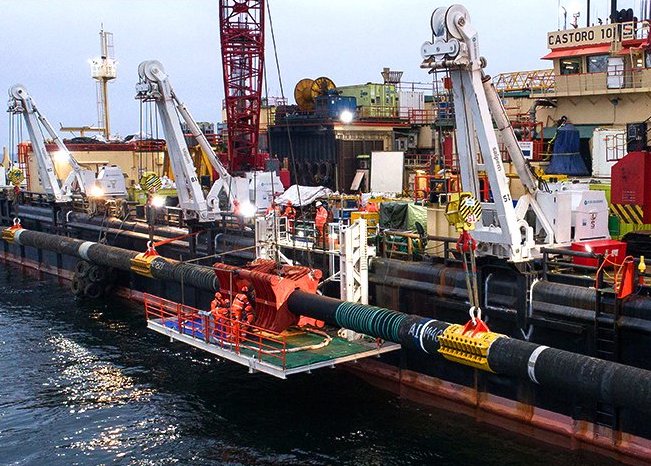DNV Completes Verification for 195-Mile Section of Baltic Pipeline
(P&GJ) — Energinet, the Danish national transmission system operator for electricity and natural gas, has received Certificates of Conformity (CoC) from DNV for its section of the offshore Baltic Pipe project.
The CoC’s were handed over at a ceremony in Energinet’s office in Ballerup, Denmark in December 2022. The £2billion ($2.38 billion) gas pipeline is a strategic infrastructure project with the goal of creating a new gas supply corridor for the European market.
Energinet's part of the large-scale project consists of 105 km (65 miles) of pipeline in the North Sea, approximately 210 km (130 miles) of pipeline underground across Denmark, an expansion of the receiving Nybro gas terminal, and a new compressor station at Everdrup in Southern Zealand. DNV also assisted with professional services to Energinet on the onshore pipelines, compressor station and gas terminal.
RELATED: Baltic Pipeline Starting to Flow Gas this Month
With an annual capacity of 10 billion cubic meters, the Baltic Pipe Project will allow gas transport from Norway to Denmark and Poland. DNV was contracted early in the project to deliver technical assurance services, and ultimately support the Authority with the permitting needed to take the new infrastructure into use. The contract scope included independent verification, complex independent modeling and submarine pipeline certification to the DNV certification regime DNV-SE-0475.
Acceptance criteria comprised of the Danish Continental Shelf Law, the world recognized standard DNV-ST-F101, and the suite of underlying DNV standards and recommended practices. Work took place during the engineering, procurement, construction, installation, hook-up, and commissioning phases of the project.
The Baltic Pipe achieved final investment decision in 2018 and was partly funded by the EU. By providing Poland with a new energy supply, enabling the country to move away from coal fired powerplants and reduce its overall CO2 emissions, the project aligns with the objective of the subsequent REPowerEU plan. This scheme sets out a series of measures to fast forward the green transition while increasing the resilience of the EU-wide energy system, in order to accelerate the move away from Russian fossil fuels.
DNV’s 2022 Energy Transition Outlook launched recently in Copenhagen forecasts that natural gas will peak in 2036, then slowly taper off to end some 10% below today's levels by 2050. Gas has staying power owing to its diversity of uses: half of the demand for gas is as final energy in manufacturing, transport and buildings, and the other half through transformation for other final uses such as electricity, petrochemicals and hydrogen production
The pipeline was opened on Tuesday, September 27, 2022, by the Danish Prime Minister (PM) Mette Frederiksen, Polish PM Mateusz Morawiecki and the Norwegian PM Jonas Gahr Støre.
“This project has become strategically important as Europe’s energy supply challenges came to the forefront of the agenda in recent months,” Prajeev Rasiah, executive vice president for Energy Systems, Northern Europe at DNV, said. “The project represents a crucial step in Poland’s desire to free itself from its reliance on Russian gas and to decarbonize its economy in line with its commitment to the Paris agreement.
Related News
Related News

- Keystone Oil Pipeline Resumes Operations After Temporary Shutdown
- Biden Administration Buys Oil for Emergency Reserve Above Target Price
- Freeport LNG Plant Runs Near Zero Consumption for Fifth Day
- Enbridge to Invest $500 Million in Pipeline Assets, Including Expansion of 850-Mile Gray Oak Pipeline
- Mexico Seizes Air Liquide's Hydrogen Plant at Pemex Refinery
- Evacuation Technologies to Reduce Methane Releases During Pigging
- Editor’s Notebook: Nord Stream’s $20 Billion Question
- Enbridge Receives Approval to Begin Service on Louisiana Venice Gas Pipeline Project
- Mexico Seizes Air Liquide's Hydrogen Plant at Pemex Refinery
- Russian LNG Unfazed By U.S. Sanctions





Comments